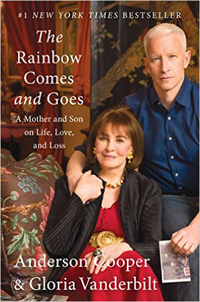 Anderson Cooper and Gloria Vanderbilt, The Rainbow Comes and Goes: A Mother and Son on Life, Love, and Loss (New York: Harper, 2016), 290pp.
Anderson Cooper and Gloria Vanderbilt, The Rainbow Comes and Goes: A Mother and Son on Life, Love, and Loss (New York: Harper, 2016), 290pp.
I had decided not to check this book out of the library, but then I noticed that it was perched in the #1 spot on the New York Times non-fiction best seller list. Could all those readers be wrong, I wondered? My instincts weren't entirely wrong — it's a strange mix of the bygone world of Downton Abbey and binge reading People magazine, with enough pain and sorrow to rival that of the Kennedy clan.
The CNN news anchor Anderson Cooper (b. 1967) is the son by the fourth marriage of the heiress Gloria Vanderbilt (b. 1924) — as in the shipping and railroad baron Cornelius Vanderbilt (1794–1877), who amassed one of the greatest fortunes of his day. "That's a big name to carry," Cooper says in the understatement of the book. He got to fly under the radar a bit as a Cooper, whereas his mother was not so lucky. In Cooper's memory, in fact, "she never once spoke of the Vanderbilts." That silence spoke volumes.
Which is to say that, as in many families both rich and poor, much history goes unspoken and consequently gets lost forever. To his credit, Cooper wanted to ask his mother those unspoken questions before it was too late. "I hope what follows will encourage you to think about your own relationships and perhaps help you start a new kind of conversation with someone you love." Although they co-write this book, it's mainly the son Anderson asking his 92-year-old mother Gloria questions, and letting her explain what she calls "the chaos I had come from."
Vanderbilt's father died from alcoholism when she was a baby. Her mother and aunt fought a bruising and very public custody trial over Gloria when she was ten, known then as "the trial of the century." She later learned her mother was gay (or bi-sexual). She watched her twenty-three-year-old son Carter, Anderson's brother, jump from the fourteenth floor of their New York City apartment. In addition to her four marriages, there were lovers like Howard Hughes, Marlon Brando, and Frank Sinatra. She was an accomplished artist, actress, and designer, but business managers defrauded her of millions. It's with good reason that toward the end of the book she quotes Faulkner: "The past isn't dead, it's not even past."
This is a cautionary tale about labeling people and making assumptions about them. Vanderbilt still recalls the sting and shame that she felt as a young girl when she read that she was a "poor little rich girl." Cooper admits that he's not a self-made man, but he bristles when people assume he inherited a trust fund (he didn't). It's impossible to relate to this sort of life, of course — riding to your private school in a chauffer-driven Rolls Royce or living in swank hotels all over the world. Nonetheless, Gloria Vanderbilt and Anderson Cooper would be the first to tell you that the cliche is true for all of us — money can't buy you love, friends, self-esteem, or personal peace. It's enough to make you grateful for the everyday life of an ordinary person.


